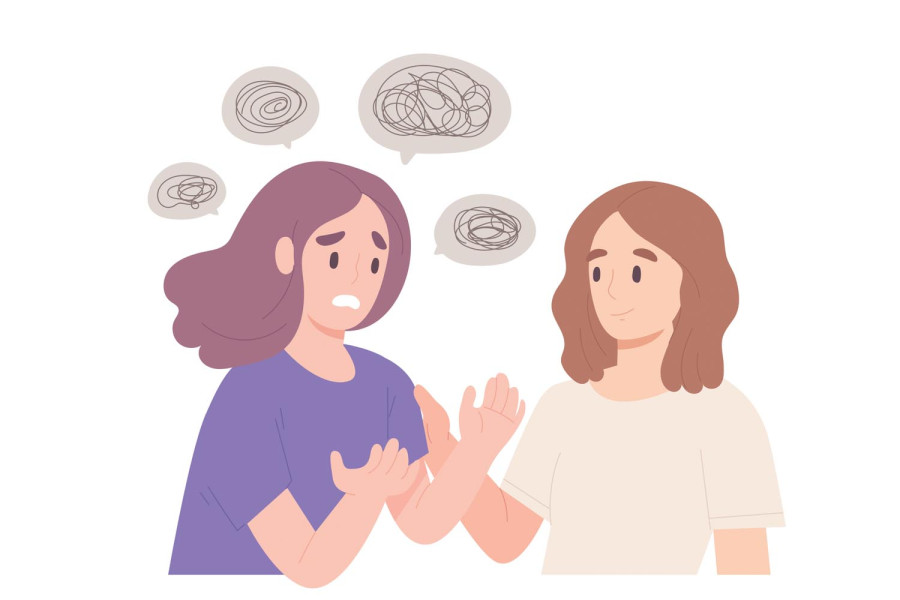Culture & Lifestyle
When empathy becomes overwhelming
Individuals experiencing empathetic distress report feelings of sadness, anxiety, and emotional fatigue.
Sujina Manandhar
Empathy is a word that expresses the beautiful way humans connect. It is how we understand people and resonate with their feelings. It's remarkable how we can shed tears for someone's sadness and share in their happiness. This feeling enables us to peer into the depths of another's soul, witnessing their pain through their eyes and joy through the sparkle in their gaze.
It is a tender touch that soothes another's wounds, a comforting embrace that whispers, "You are not alone."
Yet, sometimes empathy can also be a double-edged sword. When we hit the wall of our limitations while trying to help others, it can lead to empathetic distress, a reminder of our vulnerability and limitations. Witnessing the pain of others can evoke a symphony of emotions, from sorrow and anger to guilt and helplessness. It can also be a source of overwhelming distress.
I have recently come face to face with empathetic distress while working with children with disabilities in rural parts of Nepal. I felt a responsibility towards them as I delved deeper into their world. I felt a deep compassion and desire to do everything I could to improve their lives. However, the limitations of my abilities became painfully apparent, leading me to grapple with a sense of inadequacy—a heavy heart aching with the desire to do more, to be more. But reality sinks in, reminding me that I have limitations.
Witnessing these children's pain, I felt their frustration, despair, and the weight of their challenges. The overwhelming desire to alleviate their suffering led me to question my ability to effect real change. I was in a tug-of-war between the desire to help and the stark reality of limited resources, systemic barriers, and societal neglect.
Yes, empathy can morph into distress over time. But does that mean we should refrain from empathising? No, empathy drives us to be more human and to put more effort into pushing ourselves forward for others in need. It is important to remember that this distress reflects our humanity—a reminder that we still deeply care.
Empathetic distress is quite common in helping professions. It manifests as an emotional burden that can impact mental and physical well-being. Individuals experiencing this distress often report feelings of sadness, anxiety, and emotional fatigue as they resonate deeply with the pain and struggles of those they support.
This emotional mirroring can lead to difficulty achieving restful sleep, as thoughts about the challenges others face dominate their minds. The desire to effect positive change may clash with the reality of limitations, fostering a sense of helplessness and frustration that compounds their distress.
Physically, the symptoms of empathetic distress can manifest as tension in the chest, frequent headaches, and pervasive fatigue, serving as somatic reminders of the emotional labour involved.
Individuals may also withdraw from social interactions, feeling disconnected even in the company of loved ones, as their thoughts remain preoccupied with their emotional burdens. While rooted in genuine compassion, this distress creates a cycle of emotional exhaustion that underscores the need for self-reflection and self-care strategies to mitigate its impact. If you are experiencing these feelings, here are some practical ways to address them.
It is essential to remind ourselves that our presence matters, even if the changes we hope for are slow. Consider implementing a gratitude practice. Daily, jot down three things you’re grateful for in your work. This shifts focus from challenges to the positive impacts you make, fostering fulfilment.
Engage in creative outlets like art, music, or writing. These activities allow for emotional expression and serve as a therapeutic release, helping you process distress while reigniting your passion.
Incorporate nature therapy into your routine. Spending time outdoors—whether hiking, gardening, or simply walking—can significantly reduce stress and improve mood, providing a calming reset. Try mindful movement practices such as yoga and dance. These activities promote physical health and encourage mindfulness, helping release tension and cultivate peace.
Lastly, consider implementing story-sharing circles. Gather with colleagues or friends in a supportive environment to share experiences, challenges, and successes. This communal approach fosters connection and allows individuals to express their emotions in a safe space. Hearing others' stories can provide new perspectives, reduce feelings of isolation, and reinforce the understanding that you are not alone in your struggles.
Engaging in these circles can also serve as a reminder of the positive impact your empathy can have on the lives of others, further nurturing your emotional resilience.
But ultimately, it is through our shared humanity, our ability to feel empathy, that we find both the strength to endure and the hope to heal.




 15.87°C Kathmandu
15.87°C Kathmandu















